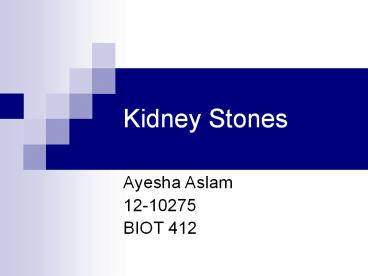Kidney Stones - PowerPoint PPT Presentation
Title:
Kidney Stones
Description:
Kidney Stones Ayesha Aslam 12-10275 BIOT 412 ... Kidney Ultrasound Retrograde Pyelogram Treatment Primary treatment Pain relievers NSAIDS e.g. Ibuprofen. – PowerPoint PPT presentation
Number of Views:257
Avg rating:3.0/5.0
Title: Kidney Stones
1
Kidney Stones
- Ayesha Aslam
- 12-10275
- BIOT 412
2
A kidney stone is a hard mass developed from
crystals thatseparate from the urine and build
up on the inner surfaces of the kidney.
3
Incidence risk factors
- Substances in abnormal quantity.
- Dehydration
- Block the flow of urine.
4
The most common cause of kidney stones is not
drinking enough water.
5
Causes
- Acc. to type of stone
- Calcium ones especially calcium oxalate. Oxalate
from certain food. - Cystine stonescystnuria.
- Urinary tract infection (women) struvite stones
- Gout chemotherapy uric acid stones.. Common in
men.
6
Symptoms and signs of a kidney stone include
excruciating, cramping painin the lower back
and/or side, groin, or abdomen as well as blood
in the urine.
7
Symptoms
- Severe pain in belly area move to groin.
- Abnormal urine color.
- Blood in urine.
- Nausea.
- Fever.
- Vomiting.
8
Signs
- Restless
- Very distress
- Pale
- Nauseated
- Sweaty
- Abdomen may feel tender to touch.
9
A helical CT scan without contrast material is
the mostcommon test to detect stones or
obstruction within the urinary tract.
10
Diagnosis/ tests
- Abdominal CT scan
- Abdominal/kidney MRI
- Abdominal x-ray
- Intravenous pyelogram (IVP)
- Kidney Ultrasound
- Retrograde Pyelogram
11
Depending on the size, most stones eventually
pass on their own within 48 hours.
12
Treatment
- Primary treatment
- Pain relievers
- NSAIDS e.g. Ibuprofen.
- Morphine
- Medication
- Allopurinol
- Antibiotics
- Diuretics
- Phosphate solution
- Sodium bicarbonate
- Surgery
13
For kidney stones that do not pass on their own,
a shock wave procedurecalled lithotripsy is
often used to break up a large stone into smaller
pieces to pass.
14
Treatment
- Extra corporeal shock wave lithotripsy
- Shock waves
- Small stones
- Percutaneous nephrolithotomy
- Endoscope
- Large stones
15
Prognosis
- 60 pass out with in 48 hrs.
- 30 require treatment.
- Risk of re-occurrence can reduce by dietary
advice.
16
To help prevent kidney stones, drink enough water
to keep your urine clear.
17
Dietary choices can affect kidney stone
development.
18
Weight gain can increase the risk of kidney
stones.
19
Research































